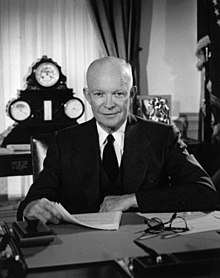List of Oval Office addresses
This article is missing information about Error: you must specify what information is missing.. (October 2016) |

The list of Oval Office addresses comprises televised speeches given by presidents of the United States from the Oval Office in the White House. Speeches from the Oval Office have often been reserved for major events of national or international importance, usually relating to the economy or military and foreign policy. Notable Oval Office addresses have included Richard Nixon's announcement of his resignation from the presidency, Ronald Reagan's remarks following the Space Shuttle Challenger disaster, George W. Bush's message to the nation following the September 11 attacks, and Barack Obama's announcement of the end of combat operations in Iraq. Three presidents have also chosen to give a farewell address from the Oval Office near the end of their terms in office: Dwight Eisenhower, Ronald Reagan, and Bill Clinton.
References
- ^ a b National Archives. "Decision to run for a second term". Retrieved 2012-12-05.
- ^ Cite error: The named reference
obama_terrorismwas invoked but never defined (see the help page). - ^ White House. "Remarks by the President in Address to the Nation on the End of Combat Operations in Iraq". Retrieved 2012-12-05.
- ^ White House. "Remarks by the President to the Nation on the BP Oil Spill". Retrieved 2012-12-05.
- ^ "In Bush's Words: Assessing the War Today, and the Risks to Avoid Tomorrow". The New York Times. 13 Sep 2007. Retrieved 2012-12-09.
- ^ "Bush: A war unlike any we have fought before". CNN. 11 Sep 2006. Retrieved 2012-12-09.
- ^ "Bush: U.S. 'a lawful society and a welcoming society'". CNN. 15 May 2006. Retrieved 2012-12-09.
- ^ "Transcript of Bush speech". CNN. 18 Dec 2005. Retrieved 2012-12-09.
- ^ "President Bush Addresses the Nation". White House. Retrieved 2012-12-09.
- ^ "Bush: U.S. feels 'quiet, unyielding anger'". CNN. 11 Sep 2001. Retrieved 2012-12-09.
- ^ "Farewell Address (January 18, 2001)". Miller Center. Retrieved 2012-12-09.
- ^ "Address to the Nation on Airstrikes Against Serbian Targets in the Federal Republic of Yugoslavia (Serbia and Montenegro)". The American Presidency Project. Retrieved 2012-12-09.
- ^ "Address to the Nation Announcing Military Strikes on Iraq". The American Presidency Project. Retrieved 2012-12-09.
- ^ Ronald Reagan Presidential library. "Address to the Nation on Events in Lebanon and Grenada". Retrieved 2012-12-05.
- ^ Ronald Reagan Presidential library. "Address to the Nation on the Soviet Attack on a Korean Civilian Airliner". Retrieved 2012-12-05.
- ^ Ronald Reagan Presidential library. "Statement on Signing the Multinational Force in Lebanon Resolution". Retrieved 2012-12-05.
- ^ Ronald Reagan Presidential library. "Address to the Nation About Christmas and the Situation in Poland". Retrieved 2012-12-05.
- ^ Ronald Reagan Presidential library. "Address to the Nation on the Economy — February 5, 1981". Retrieved 2012-12-05.
- ^ The Miller Center. "Statement on the Iran Rescue Mission (April 25, 1980)". Retrieved 2012-12-05.
- ^ The Miller Center. "Speech on Afghanistan (January 4, 1980)". Retrieved 2012-12-05.
- ^ The Miller Center. ""Crisis of Confidence" Speech (July 15, 1979)". Retrieved 2012-12-05.
- ^ The Miller Center. "Anti-Inflation Program Speech (October 24, 1978)". Retrieved 2015-01-09.
- ^ The American Presidency Project. "Remarks on Signing a Proclamation Granting Pardon to Richard Nixon". Retrieved 2012-12-05.
- ^ The American Presidency Project. "Address to the Nation Announcing Decision To Resign the Office of President of the United States". Retrieved 2012-12-05.
- ^ LBJ Presidential Library. "President Lyndon B. Johnson's Address to the Nation Announcing Steps To Limit the War in Vietnam and Reporting His Decision Not To Seek Reelection". Retrieved 2012-12-05.
- ^ NBC news. "Famous speeches from the Oval Office". Retrieved 2012-12-05.
- ^ The Miller Center. "Address on Civil Rights (June 11, 1963)". Retrieved 2012-12-05.
- ^ C-SPAN. "President Kennedy: Cuban Missile Crisis Oval Office Address". Retrieved 2012-12-05.
- ^ The Miller Center. "Farewell Address (January 17, 1961)". Retrieved 2012-12-05.
- ^ White House Historical Association. "President Dwight Eisenhower Enforces Racial Integration of Schools in Little Rock, Arkansas". Retrieved 2012-12-05.
- ^ Jackie Calmes. "Live From the Oval Office: A Backdrop of History Fades From TV". Retrieved 2013-07-10.
